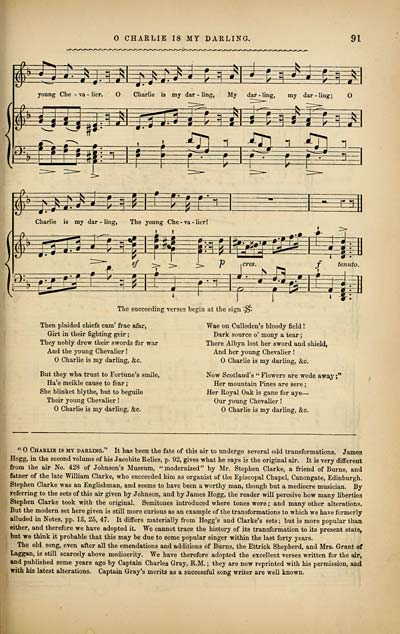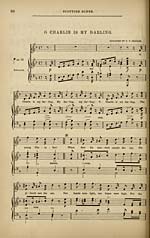Inglis Collection of printed music > Printed music > Songs of Scotland adapted to their appropriate melodies > Volume 1
(107) Page 91
Download files
Complete book:
Individual page:
Thumbnail gallery: Grid view | List view

CHARLIE IS MY DARLING.
91
^^p^Pi ^^a^^fe^ i
young Che - va - lier.
Charlie is my dar - ling, My dar-ling, my dar - ling;
^mm^^mm
s=t
SS
1
izz*
==£=
3=
■ ri :
Charlie is my dar-ling, The young Che -va- lier!
I I
=:a "" , - */ > > 5> P | cres - ,
kh
£
J era.
1 — »"
^ tenuto
i^^S
«"
=E
f
st
ftf
The succeeding verses begin at the sign '.$'•
Then plaided chiefs cam' frae afar,
Girt in their fighting geir ;
They nobly drew their swords for war
And the young Chevalier !
Charlie is my darling, &c.
But they wha trust to Fortune's smile,
Ha'e meikle cause to fear ;
She blinket blythe, but to beguile
Their young Chevalier !
Charlie is my darling, &c.
Wae on Culloden's bloody field !
Dark source o' mony a tear ;
There Albyn lost her sword and shield,
And her young Chevalier !
Charlie is my darling, &c.
Now Scotland's " Flowers are wede away ;"
Her mountain Pines are sere ;
Her Royal Oak is gane for aye —
Our young Chevalier !
Charlie is my darling, &c.
" Charlie is my darling." It has been the fate of this air to undergo several odd transformations. Jamea
Hogg, in the second volume of his Jacobite Relics, p. 92, gives what he says is the original air. It is very different
from the air No. 428 of Johnson's Museum, "modernized" by Mr. Stephen Clarke, a friend of Burns, and
fatner of the late William Clarke, who succeeded him as organist of the Episcopal Chapel, Canongate, Edinburgh.
Stephen Clarke was an Englishman, and seems to have been a worthy man, though but a mediocre musician. By
referring to the sets of this air given by Johnson, and by James Hogg, the reader will perceive how many liberties
Stephen Clarke took with the original. Semitones introduced where tones were ; and many other alterations.
But the modern set here given is still more curious as an example of the transformations to which we have formerly
alluded in Notes, pp. 13, 25, 47. It differs materially from Hogg's and Clarke's sets; but is more popular than
either, and therefore we have adopted it. Wc cannot trace the history of its transformation to its present state,
but we think it probable that this may be due to some popular singer within the last forty years.
The old song, even after all the emendations and additions of Burns, the Ettrick Shepherd, and Mrs. Grant of
Laggan, is still scarcely above mediocrity. We have therefore adopted the excellent verses written for the air,
and published some years ago by Captain Charles Gray, R.M. ; they are now reprinted with his permission, and
with his latest alterations. Captain Gray's merits as a successful song writer are well known.
91
^^p^Pi ^^a^^fe^ i
young Che - va - lier.
Charlie is my dar - ling, My dar-ling, my dar - ling;
^mm^^mm
s=t
SS
1
izz*
==£=
3=
■ ri :
Charlie is my dar-ling, The young Che -va- lier!
I I
=:a "" , - */ > > 5> P | cres - ,
kh
£
J era.
1 — »"
^ tenuto
i^^S
«"
=E
f
st
ftf
The succeeding verses begin at the sign '.$'•
Then plaided chiefs cam' frae afar,
Girt in their fighting geir ;
They nobly drew their swords for war
And the young Chevalier !
Charlie is my darling, &c.
But they wha trust to Fortune's smile,
Ha'e meikle cause to fear ;
She blinket blythe, but to beguile
Their young Chevalier !
Charlie is my darling, &c.
Wae on Culloden's bloody field !
Dark source o' mony a tear ;
There Albyn lost her sword and shield,
And her young Chevalier !
Charlie is my darling, &c.
Now Scotland's " Flowers are wede away ;"
Her mountain Pines are sere ;
Her Royal Oak is gane for aye —
Our young Chevalier !
Charlie is my darling, &c.
" Charlie is my darling." It has been the fate of this air to undergo several odd transformations. Jamea
Hogg, in the second volume of his Jacobite Relics, p. 92, gives what he says is the original air. It is very different
from the air No. 428 of Johnson's Museum, "modernized" by Mr. Stephen Clarke, a friend of Burns, and
fatner of the late William Clarke, who succeeded him as organist of the Episcopal Chapel, Canongate, Edinburgh.
Stephen Clarke was an Englishman, and seems to have been a worthy man, though but a mediocre musician. By
referring to the sets of this air given by Johnson, and by James Hogg, the reader will perceive how many liberties
Stephen Clarke took with the original. Semitones introduced where tones were ; and many other alterations.
But the modern set here given is still more curious as an example of the transformations to which we have formerly
alluded in Notes, pp. 13, 25, 47. It differs materially from Hogg's and Clarke's sets; but is more popular than
either, and therefore we have adopted it. Wc cannot trace the history of its transformation to its present state,
but we think it probable that this may be due to some popular singer within the last forty years.
The old song, even after all the emendations and additions of Burns, the Ettrick Shepherd, and Mrs. Grant of
Laggan, is still scarcely above mediocrity. We have therefore adopted the excellent verses written for the air,
and published some years ago by Captain Charles Gray, R.M. ; they are now reprinted with his permission, and
with his latest alterations. Captain Gray's merits as a successful song writer are well known.
Set display mode to: Large image | Transcription
Images and transcriptions on this page, including medium image downloads, may be used under the Creative Commons Attribution 4.0 International Licence unless otherwise stated. ![]()
| Special collections of printed music > Inglis Collection of printed music > Printed music > Songs of Scotland adapted to their appropriate melodies > Volume 1 > (107) Page 91 |
|---|
| Permanent URL | https://digital.nls.uk/94708256 |
|---|
| Shelfmark | Ing.127 |
|---|---|
| Additional NLS resources: | |
| Attribution and copyright: |
|
| Description | Scottish and English songs, military music and keyboard music of the 18th and 19th centuries. These items are from the collection of Alexander Wood Inglis of Glencorse (1854 to 1929). Also includes a few manuscripts, some treatises and other books on the subject. |
|---|
| Description | The Glen Collection and the Inglis Collection represent mainly 18th and 19th century Scottish music, including Scottish songs. The collections of Berlioz and Verdi collected by bibliographer Cecil Hopkinson contain contemporary and later editions of the works of the two composers Berlioz and Verdi. |
|---|

